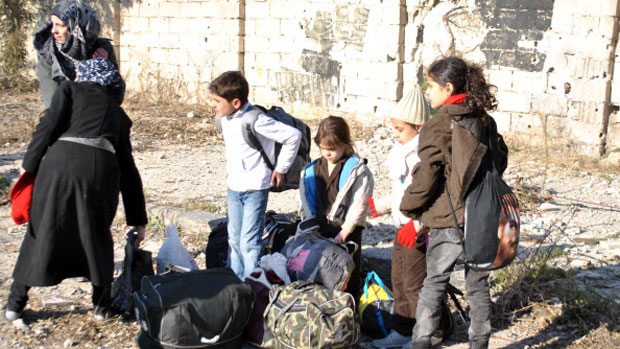Syrian peace talks resume in Geneva as hundreds escape Homs
Ceasefire set to continue in the 'capital of the revolution', but what's next for Geneva II?

A free daily email with the biggest news stories of the day – and the best features from TheWeek.com
You are now subscribed
Your newsletter sign-up was successful
THE second round of peace talks between the Syrian government and opposition has begun in Geneva as a fragile truce holds in Homs.
Last month, the first round of the Geneva II conference brought the warring sides together for the first face-to-face negotiations since the conflict began almost three years ago.
The initial talks ended with no firm compromise or agreement, but according to UN envoy Lakhdar Brahimi, some "common ground" had been reached. What has happened since then?
The Week
Escape your echo chamber. Get the facts behind the news, plus analysis from multiple perspectives.

Sign up for The Week's Free Newsletters
From our morning news briefing to a weekly Good News Newsletter, get the best of The Week delivered directly to your inbox.
From our morning news briefing to a weekly Good News Newsletter, get the best of The Week delivered directly to your inbox.
A ceasefire deal was discussed during Geneva II, but was only struck between the governor of Homs and the UN resident co-ordinator in Syria a week later, the BBC reports.
The truce was agreed upon by both sides last week to allow the evacuation of civilians and the distribution of much-needed aid in the besieged city of Homs.
The city has been under siege by government forces for almost 18 months, with no access to food or medical aid.
Over 600 people, mostly women, children and the elderly, have been evacuated from the city since Friday.
A free daily email with the biggest news stories of the day – and the best features from TheWeek.com
The evacuations were carried out by UN staff and Syrian Red Crescent volunteers, alongside the Syrian army.
Despite the agreed ceasefire, some aid agency convoys still came under mortar and gunfire attack as they attempted to deliver food, the BBC’s Lyse Doucet reports.
Evacuations are set to continue as rebels and the Bashar al-Assad government agreed to extend the truce for a further three days, Al Jazeera reports
Homs has been a key battleground since the conflict began in 2011 and has been called the ‘capital of the revolution’. What are the hopes for these talks?
The second round of talks will focus on the humanitarian aspect of the crisis. A quarter of a million people across Syria are in desperate need of aid and almost 10 million have been displaced due to the conflict.
International participants are expected to encourage the two sides to allow greater access to aid workers, by creating safe aid corridors and increasing the number of visas issued to aid workers.
David Miliband has described this phase of the talks as a discussion on how to bring "humanity to the conduct of the war".
A resolution is expected to be presented by France and other countries on how to deal with the deepening humanitarian crisis.
Lyse Doucet predicts the negotiations will be a “tortuous process” consisting of “small steps forward and big lurches backwards.”
“Peace is the ultimate prize”, she says. “But, when so many are starving, even the arrival of bread counts as progress in peace talks.”
-
 Why is the Trump administration talking about ‘Western civilization’?
Why is the Trump administration talking about ‘Western civilization’?Talking Points Rubio says Europe, US bonded by religion and ancestry
-
 Quentin Deranque: a student’s death energizes the French far right
Quentin Deranque: a student’s death energizes the French far rightIN THE SPOTLIGHT Reactions to the violent killing of an ultraconservative activist offer a glimpse at the culture wars roiling France ahead of next year’s elections
-
 Secured vs. unsecured loans: how do they differ and which is better?
Secured vs. unsecured loans: how do they differ and which is better?the explainer They are distinguished by the level of risk and the inclusion of collateral
-
 Epstein files topple law CEO, roil UK government
Epstein files topple law CEO, roil UK governmentSpeed Read Peter Mandelson, Britain’s former ambassador to the US, is caught up in the scandal
-
 Iran and US prepare to meet after skirmishes
Iran and US prepare to meet after skirmishesSpeed Read The incident comes amid heightened tensions in the Middle East
-
 Syria’s Kurds: abandoned by their US ally
Syria’s Kurds: abandoned by their US allyTalking Point Ahmed al-Sharaa’s lightning offensive against Syrian Kurdistan belies his promise to respect the country’s ethnic minorities
-
 Israel retrieves final hostage’s body from Gaza
Israel retrieves final hostage’s body from GazaSpeed Read The 24-year-old police officer was killed during the initial Hamas attack
-
 China’s Xi targets top general in growing purge
China’s Xi targets top general in growing purgeSpeed Read Zhang Youxia is being investigated over ‘grave violations’ of the law
-
 Syria’s Islamic State problem
Syria’s Islamic State problemIn The Spotlight Fragile security in prison camps leads to escape of IS fighters
-
 Panama and Canada are negotiating over a crucial copper mine
Panama and Canada are negotiating over a crucial copper mineIn the Spotlight Panama is set to make a final decision on the mine this summer
-
 Why Greenland’s natural resources are nearly impossible to mine
Why Greenland’s natural resources are nearly impossible to mineThe Explainer The country’s natural landscape makes the task extremely difficult